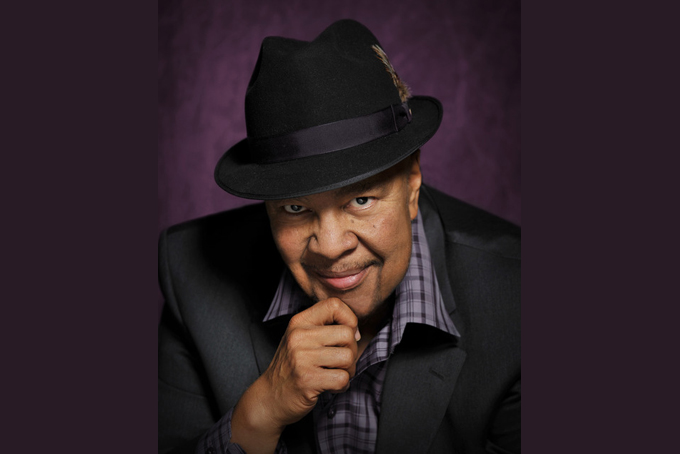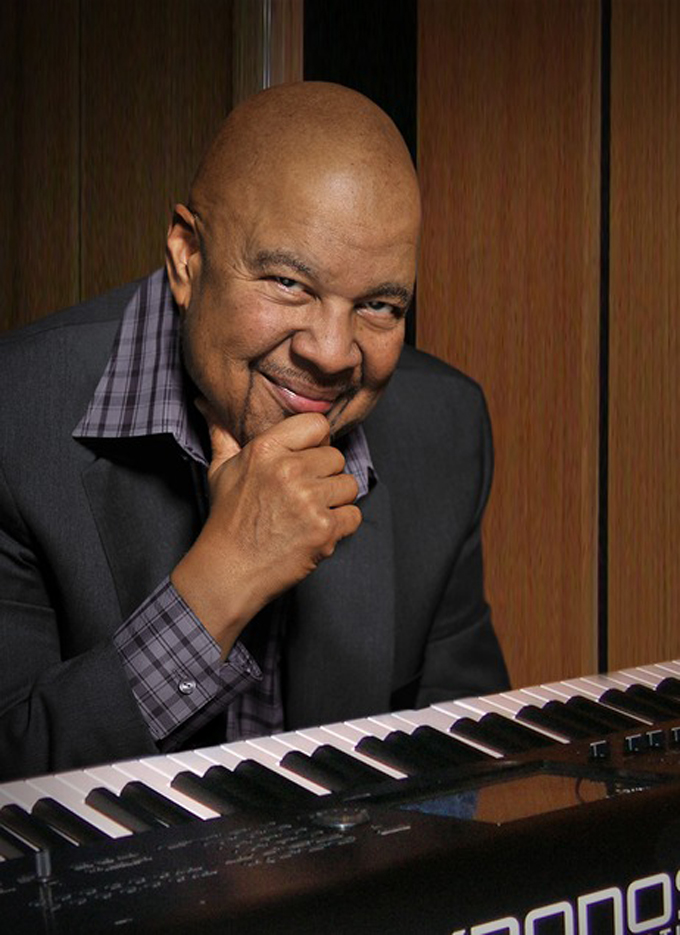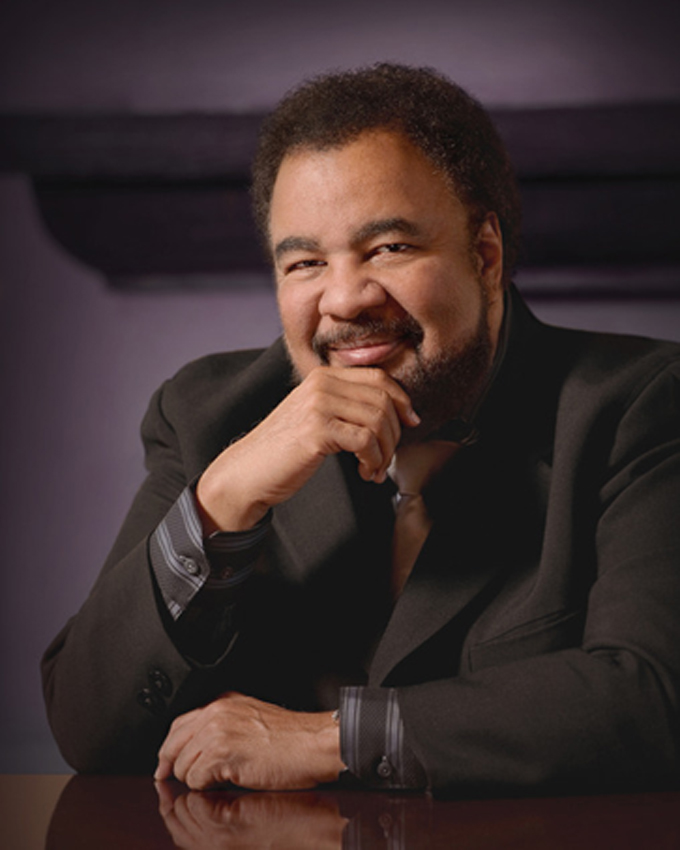
George Duke 2013 (PromoE Photo by Toshi)
Editors Note: According to the Associated Press, George Duke, the Grammy-winning jazz keyboardist and producer whose sound infused acoustic jazz, electronic jazz, funk, R&B and soul in a 40-year-plus career, has died. He was 67. A representative for Duke said the performer died Monday night in Los Angeles. Duke was being treated for chronic lymphocytic leukemia. Duke’s son, Rashid, thanked his father’s fans in a statement Tuesday. “The outpouring of love and support that we have received from my father’s friends, fans and the entire music community has been overwhelming,” he said. “Thank you all for your concern, prayers and support.”
Below is an exclusive interview by the Courier with Duke last week. He never mentioned having any health problems.

This image released by Heads Up International shows the cover art for “DreamWeaver,” by George Duke. (AP Photo/Heads Up International)
Duke dead at 67: Leaves musical legacy
Keyboardist, arranger, composer, and producer George Duke wants to give people something to think about and ponder when they listen to his music.
“The closest thing the Creator gives us to be God-like is the ability to write a song,” Duke said from his California home. “There is a pool of audio soup and we dip our fingers into it.”
Duke definitely gave his diehard fans and newcomers to his sound something to talk about and think about when he released “Dreamweaver” on the Heads Up label, a division of the Concord Music Group on July 16.
By his own admission, ‘Dreamweaver’ is Duke’s most hones record to date. He wrote the songs for the disc after his wife, Corine, passed away.
“It took me months to write the record. My mind was ready (for my wife’s passing) I knew it was coming but my spirit had to process it,” Duke said.
To help with his grief, Duke set sail on a Capital Cruise with the intention on listening to the bands that were scheduled to perform on the ship, not to write music for new album.
“For the first few days I just listened to the bands, but on the third days something happened. I returned to my cabin at 4 a.m. to watch the sun come up and I went on the deck and started writing,” Duke recalled. “I said ‘here are some awesome lyrics’ and I basically had the album written.”
“Dreamweaver,” which showcases Duke’s deft precision on various synthesizers, includes star musicians and singers like bassists Stanley Clarke and Christian McBride, singers Lalah Hathaway, Rachelle Ferrell, Jeffrey Osborne and the late Teena Marie; guitarists Paul Jackson, Jr. and the late Jef Lee Johnson.
“This is the first album that I’ve done post wife. I believe she would be very proud of it,” Duke said.
Duke’s mother took him to Jazz, Classical and Ballet concerts to help broaden his horizons and undoubtedly stir up his creativity.
It worked.
The Rafael California native was hooked after experiencing a performance by Duke Ellington.
“I don’t really remember it, but I ran around the house saying get me a piano, get me a piano!” he said with a laugh.

George Duke 2013 (PromoE Photo by Toshi)
Three years later he began his formal piano training. Early on his was influenced by his local Baptist church, but by the time he was a teenager, his musical influences had grown to include Miles Davis, Les McCann and Cal Tjader all of whom inspired Duke to join numerous high school Jazz groups.
After graduating from the San Francisco Conservatory of Music and earning a bachelor’s degree in 1967, he joined Al Jarreau and formed the house band of the popular 60’s San Francisco club, The Half Note. He also performed with fellow musicians Sonny Rollins and Dexter Gordon in other Bay area clubs too.
Duke experimented with mixing various music genres over the next few years and performed with diverse artists like Jean Luc-Ponty, Frank Zappa, Cannonball Adderly, Dizzy Gillespie, Billy Cobham and Stanley Clarke.
“I was young and I didn’t care what I got into,” Duke said. “People thought that since I had a lot of respect for a particular style of music I should stick to that but I have the option to change up as an artist.”
Duke launched his solo music career at the age of 20 and soon began creating LP’s for the MPS record label in the 70’s. Throughout the decade Duke moved toward fusion, R& B and funk with such albums as “From Me To You” in 1976, “Reach For It” in 1978 and perhaps his most well-known album, “Brazilian Love Affair” in 1980.
By the end of the 1980’s Duke had made his indelible mark in the producing arena by helping with recordings of artists across numerous musical genres including Raoul de Souza, Dee Dee Bridgewater, A Taste of Honey, Barry Manilow, Anita Baker and Melissa Manchester.
He worked as musical director for the Nelson Mandela tribute concert at London’s Wembley Stadium in 1988 and he served, along with Marcus Miller, as musical director of NBC’s acclaimed late-night music performance show, “Sunday Night.”
The 1990’s found Duke in Europe and Japan touring with Najee and Diane Reeves. That was also the time he joined the Warner Bros. record label and released the “Snapshot” album, which stayed at the top of the Jazz charts for five weeks and generated the top 10 R& B single “No Rhyme, No Reason.”
Other records released throughout the decade included “Muir Woods Suite” in 1993; and “Illusions” in 1995. He continued to produce records for other artists including Najee, George Howard, the Winans , and Natalie Cole.
In 2000, Duke cut ties with Warner Bros. and launched his own record label BPM—Big Piano Music.
“I spent 30 years at other labels as a recording artist and I felt it was time for me to step up to the next level of challenge and form a company that would give me and other artists the opportunity to create quality music and push back the material restraints that dominate most record labels these days,” he said.
Despite the challenges that come with running a record label, Duke released “Face the Music” in 2002 and continued to produce records for other artists. In 2008 he returned to his old-school roots and released “Dukey Treats” his current label home, Heads Up. From there he went on to release “De’Ja Vu” in 2010 and now “Dreamweaver.”
“I’ve always considered myself a multi-stylistic artist,” Duke said. “I try to take people on a musical journey, whether it’s on an album or in a show. I think the style of music you choose to play is really relevant, as long as you’re honest about what you’re trying to present.
“In order to really play Jazz, you have to have more than talent, you have to have an interest level for Jazz. There used to be a college circuit of tours that got people interested in it but the most you can do now are master classes and let people know what’s going on,” Duke continued. “The Internet helps. I’ve got no problem with it because it’s a way of getting music out there without a middle man. I choose to look at the glass half full. Diversity is a big key. People should not be addicted to one aspect of music.”

George Duke 2013 (PromoE Photo by Toshi)